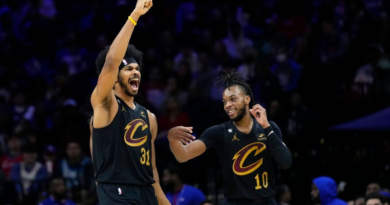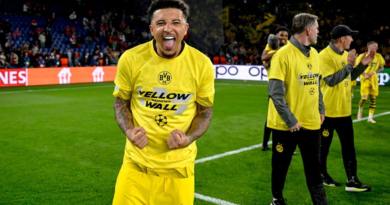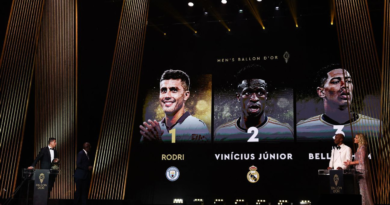What are league rules around gambling on sports? What's forbidden, getting caught and punishment
MLB and the NBA, NCAA, NFL and NHL fought a nearly 10-year legal battle with New Jersey to stop the state from legalizing sports betting and, in 2018, lost in the U.S. Supreme Court. The landmark decision brought sports betting to the forefront and put more focus on the policies leagues are relying on as the landscape evolves.
Now, with more than half the nation offering legal betting, professional leagues and collegiate sports face a new reality and a straightforward business decision about whether to participate in a growing revenue stream that is not without risk.
Just five years ago, before the Supreme Court’s ruling, roughly 1% of Americans lived in states with legal betting. Now, 56% of the population resides in jurisdictions that have launched regulated sportsbooks. Results from a May survey from the American Gaming Association estimated 39.2 million American adults had placed a traditional sports wager in the past 12 months.
Sports betting is more prevalent than ever before in American history. With that comes lucrative partnerships with sportsbooks and new advertising revenue streams. The amount sportsbook brands have spent on national TV commercials annually has increased from $21.4 million in 2019 to $314.6 million in 2022 and sports betting ads have increased by more than threefold, according to data from iSpot, a company that measures TV advertising and audiences.
“Sports betting has increased interest in sports of all kinds, including college sports, which is great for our fans,” NCAA president Charlie Baker said in a May release announcing survey results on the prevalence of sports betting among young adults. “But the NCAA and everyone from coaches to athletics department staff and college presidents must better understand what impact sports betting may have on student-athletes.”
Professional leagues, through their betting partnerships with sportsbook operators and integrity firms that monitor sports betting, also have gained significantly more visibility into the bets on the games. And they haven’t always liked what they’ve found.
Up to five NFL players, including Colts cornerback and kick returner Isaiah Rodgers, are expected to receive season-long suspensions this week for allegedly gambling, sources told ESPN NFL Insider Adam Schefter.
In early May, more than 40 student-athletes from Iowa and Iowa State were flagged in a betting investigation, and Alabama baseball coach Brad Bohannon was fired after being linked to alleged suspicious betting activity. Seven NFL players, at least one assistant coach and an undisclosed number of team employees have been found to have violated the league’s gambling policy in the past five years.
The gambling policies of the NCAA and major professional sports leagues differ. To get an idea of what’s allowed for players, coaches, front-office staff and referees, we break it down by sport to see how they’re navigating the evolving American betting scene. — David Purdum
Colleges
Is sports gambling allowed? Mostly no. Gambling on any sport sponsored by the NCAA at any level (pro, college, youth) is prohibited. Gambling on sports such as horse racing, boxing, MMA or cricket is allowed.
Who does this apply to? It applies to student-athletes, coaches, administrators and officials.
Where is sports gambling allowed? NCAA rules do not govern where an activity takes place; however, there could be institutional or conference policies that outline time, place and manner restrictions.
Does this include any wager? Putting something at risk to win something in return (even if for less than $1) on a pro, college or amateur sporting event is a sports wagering violation that risks eligibility.
Does this include Super Bowl squares, NCAA tournament brackets or fantasy sports? Yes, if a sport is sponsored by the NCAA, no matter the wager, it is off-limits.
Are athletes required to sign a statement acknowledging gambling rules? Yes, the NCAA requires student-athletes to annually sign a document known as the NCAA Student-Athlete Statement. That statement covers the NCAA’s eligibility rules from gambling to drug testing.
What are the punishments? When a school discovers an NCAA rules violation has occurred, it must declare the prospective or enrolled student-athlete ineligible and may request their eligibility be reinstated through the Requests/Self Reports Online (RSRO) system. The Student-Athlete Reinstatement (SAR) staff reviews each request individually based on its own merits and set of specific facts. A recent example would be Virginia Tech linebacker Alan Tisdale, who received a nine-game suspension in 2022 (it was later reduced to six games) after self-reporting that he used an online gambling app to bet on the NBA Finals. For athletics personnel, violations are evaluated on a case-by-case basis. For officials during regular-season competition, matters of eligibility are determined at the conference level.
College athletes who engage in wagering activities that influence the outcomes of their own sports can lose their eligibility permanently, while those who engage in wagering activities for the same sport but involving a different school can lose 50% of one season of eligibility. For other wagering violations, including wagering on pro sports, the total dollar amounts involved would be considered to determine punishment and reinstatement. Those wagering $200 or less would only be subject to sports wagering rules and prevention education, while wagers between $201-$800 could cost athletes 10-20% of a season of eligibility. Wagers greater than $800 could cost 30% of a season of eligibility, while those involved in wagers that “greatly exceed $800” could be subject to additional eligibility penalties, including permanent eligibility loss.
Postseason officials are screened for gambling or sports wagering. The screening process is a comprehensive background check that includes the review of any criminal charge(s) or conviction(s) with elements of deception (e.g. identity theft, fraud, forgery, uttering, embezzlement) and/or criminal charge(s) or conviction(s) involving gambling or sports wagering — these are flagged and may cause an official to be ineligible. Information found in the screening is also used to evaluate potential risk.
How are they catching offenders? The NCAA works with an integrity monitoring service that tracks, flags and analyzes betting data. That strategy includes a periodic assessment of wagering on all competitions — and an immediate notification if there is suspicious wagering — and utilizes proprietary intelligence and investigation services. — Adam Rittenberg
MLB
Is sports gambling allowed? Yes, on anything not related to baseball. That means betting on amateur games and fantasy baseball are off-limits. Otherwise, players are allowed to gamble in “jurisdictions in which such bets are legal.”
Who does this apply to? All in-uniform personnel, as well as team and league employees. This includes both full-time and seasonal workers.
Where is sports gambling allowed? There are no restrictions to where gambling is allowed, provided it’s not with illegal bookmakers or illegal offshore betting websites.
Does this include any wager? Yes.
Does this include Super Bowl squares, NCAA tournament brackets or fantasy sports? Super Bowl squares or NCAA brackets are fair game — but anything related to baseball is illegal. That would include betting on home run derbies, playoff odds, college baseball, in-game betting and fantasy baseball, for example.
Are athletes required to sign a statement acknowledging gambling rules? No. The rules governing gambling are spelled out in the collective bargaining agreement between the players and the league, which was signed in 2022.
What are the punishments? Punishments depend on the severity and can carry suspensions up to and including permanent ineligibility from MLB or Minor League Baseball. The timelines set in Major League Rule 21 are as such: “For bets placed with illegal bookmakers, the punishment is up to the Commissioner’s discretion. Any bet on a baseball game that does not involve the player will receive a one-year ineligibility ruling; if a player bets on games he can affect, it is a lifetime ban.”
There are other examples, though. Tanking a game or asking someone else to lose on purpose also will lead to a permanent expulsion. A three-year ban will be enforced if personnel offer or receive a gift for defeating an opponent. Offering a gift to an umpire leads to permanent ineligibility.
How is it catching offenders? The league collaborates with regulators, sportsbooks and independent integrity monitors to enforce the policies and monitor betting activity. MLB conducts in-house investigations of any alleged rule violation.
Despite hosting two of sports’ most famous gambling controversies — the 1919 “Black Sox” scandal and Pete Rose’s lifetime ban — baseball hasn’t had a rampant problem in recent decades. The last player to be suspended was minor leaguer Pete Bayer in 2021; he is on the ineligible list for betting on MLB games in Colorado in 2020 after the MiLB season was canceled. In Bayer’s case, his bets were flagged by the Colorado division of gaming because his MLB employment made him a prohibited bettor. — Jesse Rogers
NBA
Is sports gambling allowed? Anyone affiliated with the NBA — players or employees for any of the 30 teams or the league overall — cannot bet on the NBA or any of its properties. That includes the NBA, summer league, WNBA, G-League, Basketball Africa League or NBA2K League. Presuming sports betting is legal where someone is, betting on other sports is permitted.
Who does this apply to? Anyone either playing or working for a team or the league.
Where is sports gambling allowed? If sports betting is legal where the players are, anyone playing or working for a team can do so as long as it’s not betting on the NBA or any of its properties. Being inside the team facilities or on the road is not a factor.
Does this include any wager? No amount of money can be bet on any NBA-related property. There isn’t a limit on wagers outside of that.
Does this include Super Bowl squares, NCAA tournament brackets or fantasy sports? Fantasy basketball can be played, but without cash prizes. Other such non-NBA-related pools are allowed.
Are athletes required to sign a statement acknowledging gambling rules? Nothing has to be signed. Language that states players are bound by the player conduct memo is within the league’s collective bargaining agreement, which covers topics such as sports gambling.
What are the punishments? Discipline could include fines, suspensions and possible termination of contracts, among other actions. The NBA has dealt with gambling controversy. An FBI investigation revealed that referee Tim Donaghy had bet on games across the 2005-06 and 2006-07 seasons, including games he officiated. Donaghy was sentenced to 15 months in prison and never worked another NBA game.
How is it catching offenders? Each NBA team has a dedicated person for all sports betting matters, while the league has a team of data scientists focused on sports betting anomalies and possible integrity issues and also works with third-party integrity monitors. — Tim Bontemps
NFL
Is sports gambling allowed? Players are allowed to bet on non-NFL events with legal sportsbooks, but all other league personnel, including coaches, officials and trainers are prohibited from all sports betting.
Where is sports gambling allowed? Players may not place bets from any team or league facilities nor when they’re on the road with their team.
Does this include any wager? Yes.
Does this include Super Bowl squares, NCAA tournament brackets or fantasy sports? NFL players are not allowed to participate in Super Bowl squares pools. They can play fantasy sports with some restrictions on the type of contests and the value of the prizes available. NFL personnel may not accept prizes from any season-long fantasy contests in excess of $250. They are not allowed to participate in any “daily or other similar short duration fantasy football game that offers a prize.”
The 2022 NFL gambling policy states, “These prohibitions are intended to avoid any appearance of impropriety which may result from participation in fantasy football games by an individual perceived to have an unfair advantage due to the preferential access to information.”
Are athletes required to sign a statement acknowledging gambling rules? Yes, as it’s part of the player contract. Each contract has a section in which the player must acknowledge the league rules spelled out in the CBA.
What are the punishments? Players who have been found to have placed bets on the NFL have received indefinite suspensions of at least one year. Players who have been found to have placed bets while at team or league facilities have received six-game suspensions.
Former Detroit Lions receiver Quintez Cephus, former Lions safety C.J. Moore and former Washington Commanders defensive end Shaka Toney were suspended in April for at least one year for allegedly betting on the NFL. The same penalty was levied against Jacksonville Jaguars wide receiver Calvin Ridley in 2022, when he was with the Atlanta Falcons, and former Arizona Cardinals defensive back Josh Shaw in 2019. Ridley was reinstated in March.
Also in April, Lions wideouts Stanley Berryhill and Jameson Williams were suspended for six games for allegedly placing bets — not on NFL games — while at a team facility. And in December, New York Jets wide receivers coach Miles Austin was suspended by the league for, according to his legal representation, “wagering on table games and non-NFL professional sports.”
How is it catching offenders? The NFL beefed up its in-house technology, dedicating security personnel to the space and partnering with sportsbooks and integrity firms to create a network that monitors the betting market and identifies improper bettors. The league now has more visibility of bets on the NFL, where they’re placed and who has made them.
Sportsbooks and state regulators use geolocation services to track where bets are placed. After the suspensions in April, the NFL Players Association sent an email to all agents, alerting them that some of the violations involved players placing bets while using mobile apps on their phones while at work or while traveling with their teams. — Purdum
NHL
Is sports gambling allowed? The collective bargaining agreement states: “Gambling on any NHL Game is prohibited.” That rule is also posted in every dressing room around the league. The NHL constitution, a document that details everything from club ownership rules to the powers of the commissioner, conveys similar information. Players and those working for a team or the league are allowed to bet on non-NHL events.
Who does this apply to? It applies to players and those working for a team or the league.
Where is sports gambling allowed? The NHL has no formal policy on where sports wagering is allowed. If there are any restrictions, they would be administered on a team-by-team basis.
Does this include any wager? The only specific gambling prohibition is betting on NHL games.
Does this include Super Bowl squares, NCAA tournament brackets or fantasy sports? Players are allowed to wager on any sport outside of the NHL, including Super Bowl squares, March Madness brackets, fantasy sports and other wagers, either with sports gambling outlets or among friends.
There have been instances in the past in which players made news for their non-hockey wagering. Jaromir Jagr owed more than $500,000 to an Internet gambling site back in 2003. Former NHL winger Thomas Vanek owed hundreds of thousands of dollars to a bookmaker for betting on football and basketball games. Neither player was punished because they didn’t bet on the NHL.
Are athletes required to sign a statement acknowledging gambling rules? Yes, as it’s part of their standard player contract. There is a section in which the player must acknowledge the league rules spelled out in the CBA.
What are the punishments? Under Involuntary Termination (Section 3.9), “the wagering or countenancing of wagering by its officers or employees on any hockey game and/or games” is prohibited. Violations of that rule could cause a team owner to be suspended by the NHL or have their membership terminated if three-fourths of the teams approve that action.
NHL commissioner Gary Bettman is empowered by the CBA to impose discipline on any player for violating an off-ice league rule or a player guilty of conduct that’s “detrimental to the welfare of the league or the game of hockey.” The CBA spells out three forms of punishment for the commissioner: A fine, canceling the player’s contract or expelling or suspending the player “for a definite or indefinite period.”
How is it catching offenders? The NHL’s efforts to enforce its sports wagering rules were center stage recently as the league investigated Edmonton Oilers winger Evander Kane in 2021.
Then a player for the San Jose Sharks, Kane and his wife, Deanna, were entering divorce proceedings when she used social media to claim he bet on Sharks games “with bookies” and threw games for gambling purposes. Kane, who denied the accusations, had been a well-known gambler. In filing for Chapter 7 bankruptcy, Kane claimed to have lost $1.5 million gambling “at casino and via bookie” over a 12-month span.
The NHL’s investigation was led by Jared Maples, the former head of the New Jersey Office of Homeland Security and the NHL’s executive vice president and chief security officer. He enlisted the help of Patterson Belknap Webb & Tyler LLP. It looked for any paper or electronic trail that could connect Kane with a wager made on an NHL game. In September 2021, the NHL announced it found no evidence that Kane bet on NHL games or impacted their outcome for wagering purposes.
In 2021, the NHL struck a 10-year deal with Sportradar that included being an official integrity services provider for the league. The company features a universal fraud detection system (UFDS) to proactively help safeguard and ensure the integrity of its competition by monitoring global gaming activity and trends worldwide.— Greg Wyshynski




